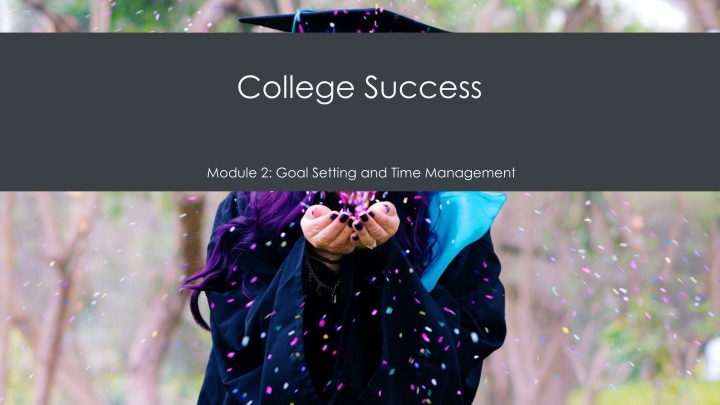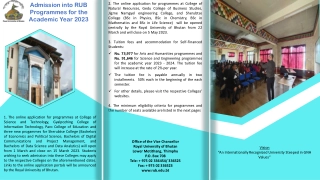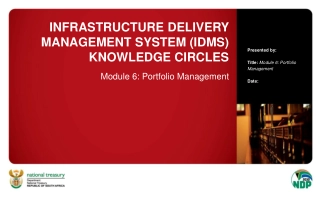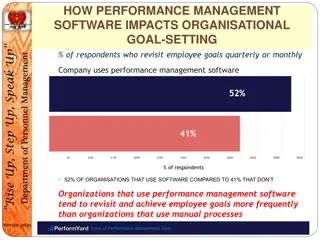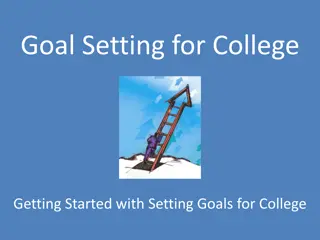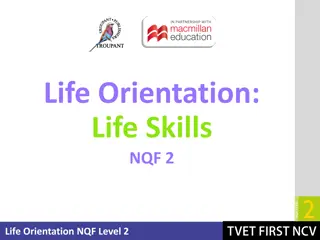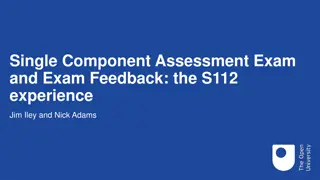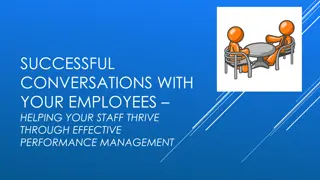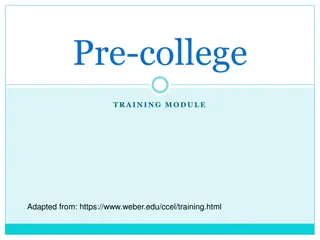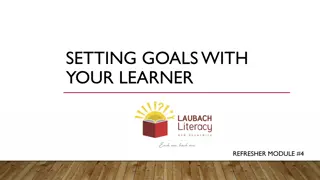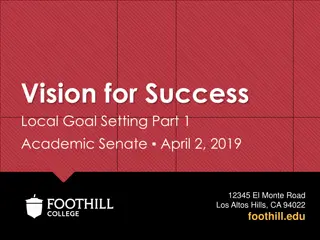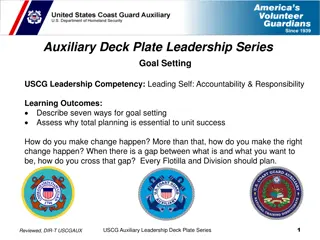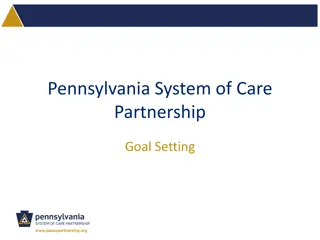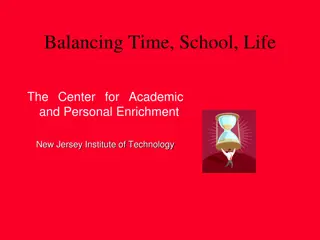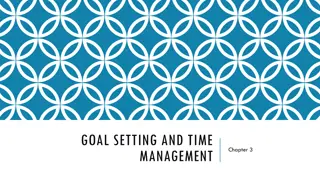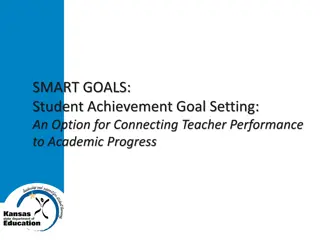College Success Module 2: Goal Setting and Time Management
Establishing clear goals and effective time management are crucial for academic and personal success. This module delves into the significance of defining goals, utilizing motivational strategies, leveraging social networks, and identifying barriers to goal achievement. Learn the art of setting SMART goals and discover motivational insights shared by influential personalities such as Haroon F. Mirza and Stephen Covey. Enhance your goal-setting skills by understanding the five rules of successful goal setting. Embrace the power of your social network in achieving your aspirations by engaging with peers, participating in community activities, and maintaining a positive outlook.
Download Presentation

Please find below an Image/Link to download the presentation.
The content on the website is provided AS IS for your information and personal use only. It may not be sold, licensed, or shared on other websites without obtaining consent from the author.If you encounter any issues during the download, it is possible that the publisher has removed the file from their server.
You are allowed to download the files provided on this website for personal or commercial use, subject to the condition that they are used lawfully. All files are the property of their respective owners.
The content on the website is provided AS IS for your information and personal use only. It may not be sold, licensed, or shared on other websites without obtaining consent from the author.
E N D
Presentation Transcript
College Success Module 2: Goal Setting and Time Management
Learning Outcomes: Defining Goals 2.1.1 Explain how time management plays a factor in goal setting, leading to short- term, medium-term, and long-term objectives 2.1.2 Identify and apply motivational strategies to support goal achievement 2.1.3 Describe how a social network can help accomplish goals 2.1.4 Consider factors that might hinder goal achievement and possible ways to address these issues
Time Management and Goal Setting Success begins with goals. Five Rules of Goal Setting: How to set SMART, Motivating Personal Goals Get your free Goal-Setting Toolkit at http://www.mindtools.com/pages/article/newHTE_90.htm Have you thought about what you want to be doing in five years' time? Are you clear about what your main objectives at work are? Do you know what you want to achieve by the end of the day? If you want to enjoy success, you need to set yourself goals. Without these, you lack focus and direction. Goal setting not only allows you to take control of your life's direction; it also provides you a benchmark for determining whether you are actually succeeding. Think about it: having a million dollars in the bank is only proof of success if one of your goals is to amass riches. If your goal is to practice acts of charity, then keeping the money for yourself is suddenly contrary to how you would define success. To accomplish your goals, however, you need to know how to set them. You can't simply say, "I want" and expect it to happen. Goal setting is a process that starts with careful consideration of what you want to achieve, and ends with a lot of hard work to actually do it. In between there are some very well defined steps that transcend the specifics of each goal. Knowing these steps will allow you to formulate goals that you can accomplish. This video highlights five rule sof successful goal setting. In this video, take notes about how to set motivating goals. Also, take notes on how to set SMART Goals.
Motivational Strategies to Support You Haroon F. Mirza: Recognize the defining moments in your life and use them to change your trajectory. Dr. Nido R. Qubein: All meaningful change comes from within. Your beliefs lead to your behaviors which then lead to the results you want to see in your day to day life. Stephen Covey: You have the power to overcome your past in order to change your future. Lil Wayne: As a young adult you have the responsibility to work hard to create a future for yourself.
Social Aspects of Achieving Your Goals Your best resource for achieving your goals is your social network. Here are some ways to tap into your People Power: Make new friends Study with friends Get an internship Volunteer Actively engage in the college community Find work related to your curriculum Stay connected via social media Keep a positive attitude
Dealing with Setbacks and Obstacles Problem solving strategies: 1. What is the problem? Define the problem in detail. How is it affecting me and other people? 2. How are other people dealing with this problem? Are they adjusting their time management skills? 3. What is my range of possible solutions? Are solutions realistic? 4. What do I need to do to implement solutions?
Learning Outcomes: Your Physical Environment 2.2.1 Analyze the impact of your surroundings while you study 2.2.2 Define distraction and multitasking, and describe how personal technology may help or hinder your study efforts
The Impact of Your Surroundings While You Study Educational Consultant Explains Importance of College Study Spaces Mark Montgomery, educational consultant and college admissions expert, reminds prospective university students that while their image of college may be composed largely of parties and meeting attractive people and the like, they will (ideally) be spending a good portion of their time studying, and doing so in their dorm rooms may not be such a great idea. He advises students to scope out studying spaces when touring a school, and shows some of the offerings at Seattle University. If you seek guidance in the college admissions process and need help selecting the right college for you, contact Mark Montgomery at http://greatcollegeadvice.com, or call 720.279.7577. His team of experts in college admission, student advising, career counseling, and college counseling can help you with your college applications, your college essays, and with financial aid. Montgomery Educational Consultants offers personalized educational counseling to students and their families as they navigate the complex process of selecting and applying to colleges and universities. Since 2006, our company has provided affordable, Great College Advice to hundreds of students from across the United States and around the world. Our mission is to provide students and families with the highest standard of assistance in the college and graduate school selection and admissions process. We assist students in finding the school that best fits their abilities, interests, and aspirations and guide them as they complete their applications, write their essays, and present themselves in the best light throughout the admissions process. While we are based in Denver, Colorado, and Westfield, New Jersey, our reach isn t just in these local areas. We serve students nationally and internationally, too. In fact, fully 25% of our clients come from beyond these two states in the U.S., and another 25% have come from China, Singapore, Taiwan, India, France, Great Britain, Hong Kong, Mexico, Belarus, Canada, Romania, and Oman. No matter where you are located, Montgomery Educational Consulting can assist you in your college and university planning. TRANSCRIPT: So one of the things I like to do when I visit a college campus is to check out the study spaces. And some of my students of course think I m crazy because how boring is that to think about studying when you re in college. Much more fun to think about all the parties and all the social things and all the activities you might be involved in. But you will spend a lot of time studying. So I do ask students when I m on a tour or when I m looking around, Where are the possible places or what are the kinds of places you can find on campus to study? A lot of students like to study in their dorm room. I m not always sure I like that, I think that s a great idea, but here at Seattle University in Seattle, they have all these individual study rooms that you can come and grab. This is a Saturday; there are hardly any of them being used. People are doing other kinds of things today. But very comfortable, nice chairs, Herman Miller, really great place to sit down. And then over here, there s another little room here for students to sit down and relax and have a little bit more informal kind of studying reading, working on a particular homework. You have cup holders here and everything so you can have your drink that you buy down in the caf , down in the library. And then over here, there s another group study room right here so that you can reserve the room for a group of you, if you have a project that you re working on with other students. You can actually here, you can reserve it with a touch pad and keep it for two hours without running into another reservation. It tells you whether it s available or unavailable. And then if you want to do it in advance, you can go online here at the university and you can reserve that room well in advance. So this is just a sample of the kinds of places where you could study in a library. Often the different floors, Beach One has it s own kind of study space. It s a good thing to check out because you are going to be spending some time studying. I know that sounds kind of crazy, but you are going to spend time studying and you want to be able to know, Well where are the cool places? Where are the quiet places? Where are the places that are going to be right for me to study and get my work done? So think about that when you re choosing a college. Here is a short video about accommodating study spaces at Seattle University.
Discussion Question Write a brief reflection about where and when you like to study. Do you study in the morning? Afternoon? Evening? Here are some other questions to consider: Where do you like to study on and off campus? Do you listen to music? Do you prefer to be alone or around other people?
Distractions and Multitasking Is multitasking real? Can we do multiple things at the same time productively? How to become more productive: Try batch processing. Have set times during the day for checking and responding to emails. Use concentrated time. Block of time for working on just one task. Do what s most important first. Make goals for the day and accomplish them.
Learning Outcomes: Your Use of Time 2.2.1 Analyze the impact of your surroundings while you study 2.2.2 Define distraction and multitasking, and describe how personal technology may help or hinder your study efforts
Uses of Time in Daily Life To be successful in college, it s imperative to be able to effectively manage your time Alleyoop Advice: Time Management in College Who doesn't love a little free time? You can use it to play video games, watch TV, hang with friends... maybe until you get to college. Then you need to use that time wisely. College student Angel Aquino explains how he has managed all of his extra free time. At Alleyoop, our goal is to help you achieve your school goals and take control of your future. Get started today: http://www.alleyoop.com What has surprised you the most about college so far?
168 Hour Exercise Access The 168-Hour Exercise How Do I Use My Time Now? from Ohio University s Academic Advancement Center. Take a minute to fill in the boxes about how you spend your time. It can help you understand how you use your time now and decide if you need to make changes.
Identify Your Time Management Style Different styles: 1. The Early Bird 2. The Balancing Act 3. The Pressure Cooker 4. The Improviser
Practice Question What is your time management style? Are you a combination of more than one style? How so? Why? Write a brief reflection about how you manage your time as a student and in your personal life.
Create a Schedule Questions to ask when creating your schedule: Will you have tests or exams in this course? When are those scheduled? Are there assignments and papers? When are those due? Are there any group or collaborative assignments? You ll want to pay special attention to the timing of any assignment that requires you to work with others.
Get Better at Prioritizing Effective Strategies for Overcoming Procrastination: 1. Keep your studying bite-sized : break your task down 2. Turn it off: phone, chat windows, TV, etc. 3. Set up a reward system: remember reward based systems only work if you stick to an honor system. 4. Study in a place reserved for studying ONLY: your bedroom often has too many distractions 5. Use checklists: checking off a to-do list can increase satisfaction and motivation.
Class Discussion: Procrastination Find a partner. Think of a time that you ve procrastinated as a student. Describe the situation to your partner. Share what worked and what didn t work in that situation. What would you do different now?
Quick Review Success begins with goals Your support system will be your most crucial resource for successfully achieving your goals Be aware of your surroundings Know your Time Management Style Know how to prioritize and avoid procrastination to better schedule your time.
